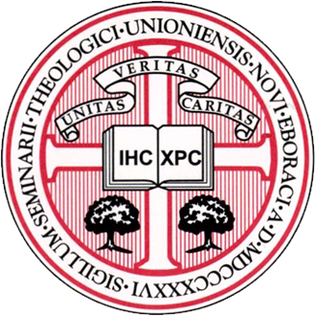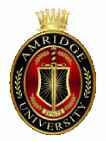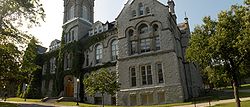
Union Presbyterian Seminary is a Presbyterian seminary in Richmond, Virginia, and Charlotte, North Carolina, offering graduate theological education in multiple modalities: in-person, hybrid, and online.

Union Theological Seminary in the City of New York (UTS) is a private ecumenical Christian liberal seminary in Morningside Heights, Manhattan, affiliated in Columbia University. Since 1928, the seminary has served as Columbia's constituent faculty of theology. In 1964, UTS also established an affiliation with the neighboring Jewish Theological Seminary of America. UTS confers the following degrees: Master of Divinity (MDiv), Master of Divinity & Social Work dual degree (MDSW), Master of Arts in religion (MAR), Master of Arts in Social Justice (MASJ), Master of Sacred Theology (STM), and Doctor of Philosophy (PhD).

Muskingum University is a private university in New Concord, Ohio. Chartered in 1837 as Muskingum College, the institution is affiliated with the Presbyterian Church (USA). New Concord is located in far eastern Muskingum County, which derives its name from the Muskingum River. Muskingum offers more than 40 academic majors. Graduate programs are offered in education and management information systems, strategy and technology. Muskingum's campus consists of 21 buildings, a football stadium, and a small lake which all sit atop 225 acres (0.91 km2) of rolling hills overlooking New Concord. Alumni are referred to as the "Long Magenta Line" and students are known simply as "Muskies" while its athletic teams are called the "Fighting Muskies".

Brandon University is a university located in the city of Brandon, Manitoba, Canada, with an enrolment of approximately 3,375 (2020) full-time and part-time undergraduate and graduate students. The current location was founded on July 13, 1899, as Brandon College as a Baptist institution. It was chartered as a university by then President John E. Robbins on June 5, 1967. The enabling legislation is the Brandon University Act. Brandon University is one of several predominantly undergraduate liberal arts and sciences institutions in Canada.

Harvard Divinity School (HDS) is one of the constituent schools of Harvard University in Cambridge, Massachusetts. The school's mission is to educate its students either in the academic study of religion or for leadership roles in religion, government, and service. It also caters to students from other Harvard schools that are interested in the former field. HDS is among a small group of university-based, non-denominational divinity schools in the United States.
The Presbyterian College/Le Collège Presbytérien, 3495 University Street, Montreal, Quebec, is a Theological College of the Presbyterian Church in Canada, and is affiliated with McGill University through its School of Religious Studies. The Presbyterian College's student base comes from across Canada and around the world.

Knox College is a postgraduate theological college of the University of Toronto in Toronto, Ontario, Canada. It was founded in 1844 as part of a schism movement in the Church of Scotland following the Disruption of 1843. Knox is affiliated with the Presbyterian Church in Canada and confers doctoral degrees as a member school of the Toronto School of Theology.
In Western universities, a Bachelor of Divinity or Baccalaureate in Divinity is a postgraduate academic degree awarded for a course taken in the study of divinity or related disciplines, such as theology or, rarely, religious studies.
Manitoba College was a college that existed in Winnipeg, Manitoba, Canada, from 1871 to 1967, when it became one of the University of Winnipeg and University of Manitoba’s founding colleges. It was one of the first institutions of higher learning in the city of Winnipeg and the province of Manitoba. The first graduating class had 12 members.
Tyndale University is a Canadian private interdenominational evangelical Christian university in Toronto, Ontario, which offers undergraduate and graduate programs. Tyndale students come from over 40 different Christian denominations.

Candler School of Theology is one of seven graduate schools at Emory University, located in metropolitan Atlanta, Georgia. A university-based school of theology, Candler educates ministers, scholars of religion and other leaders. It is also one of 13 seminaries affiliated with the United Methodist Church.
An affiliated school is an educational institution that operates independently, but also has a formal collaborative agreement with another, usually larger institution that may have some level of control or influence over its academic policies, standards or programs.

Yale Divinity School (YDS) is one of the twelve graduate and professional schools of Yale University in New Haven, Connecticut.

Christ College, formerly known as the Presbyterian Theological Centre, is the theological college of the Presbyterian Church of Australia in New South Wales. It provides theological education for ministry candidates and members of the laity. It is an approved teaching institution of the Australian College of Theology.
The Vancouver School of Theology is a ecumenical divinity school located on the campus of and affiliated with the University of British Columbia. VST is called to educate and form thoughtful, engaged and generous Christian leaders.

Queen's University at Kingston, commonly known as Queen's University or simply Queen's, is a public research university in Kingston, Ontario, Canada. Queen's holds more than 1,400 hectares of land throughout Ontario and owns Herstmonceux Castle in East Sussex, England. Queen's is organized into eight faculties and schools.

University of Saskatchewan has over 200 academic programs on its Saskatoon, Saskatchewan campus, and is internationally known for its teaching and research. The on-campus synchrotron Canadian Light Source makes it the only Canadian institution for such nuclear and biotechnology research. Canadian Light Source nuclear research facility provides research and analysis of the internal structures of advanced materials and biological samples. The College of Arts and Science is the largest of the U of S and comprises five separate health science fields in addition to numerous other programs in the Arts, Social Sciences, Humanities, and Natural Sciences. The Department of Computer Science as well as the College of Engineering are ranked highly within their fields. The founding college, the College of Agriculture, is still providing agricultural breakthroughs which are utilized worldwide.

Amridge University is a private university affiliated with the Churches of Christ with its main campus in Montgomery, Alabama. It was previously known as Alabama Christian School of Religion, Southern Christian University, and Regions University, and is a successor institution to Alabama Christian College.
Douglas John Hall is an emeritus professor of theology at McGill University in Montreal, Quebec, and a minister of the United Church of Canada. Prior to joining the McGill Faculty of Religious Studies in 1975 he was MacDougald Professor of Systematic Theology at St Andrew's College in the University of Saskatchewan (1965–1975), Principal of St Paul's College in the University of Waterloo (1962–1965), and minister of St Andrew's Church in Blind River, Ontario (1960–1962).

Taiwan Seminary or Taiwan Theological College and Seminary or Taiwan Graduate School of Theology, also known as 'Taishen' is a private Presbyterian educational institution in Taipei, Taiwan. It constitutes one of three seminaries of the Presbyterian Church of Taiwan, along with Tainan Theological College and Seminary and Yushan Theological Seminary in Hualien.













